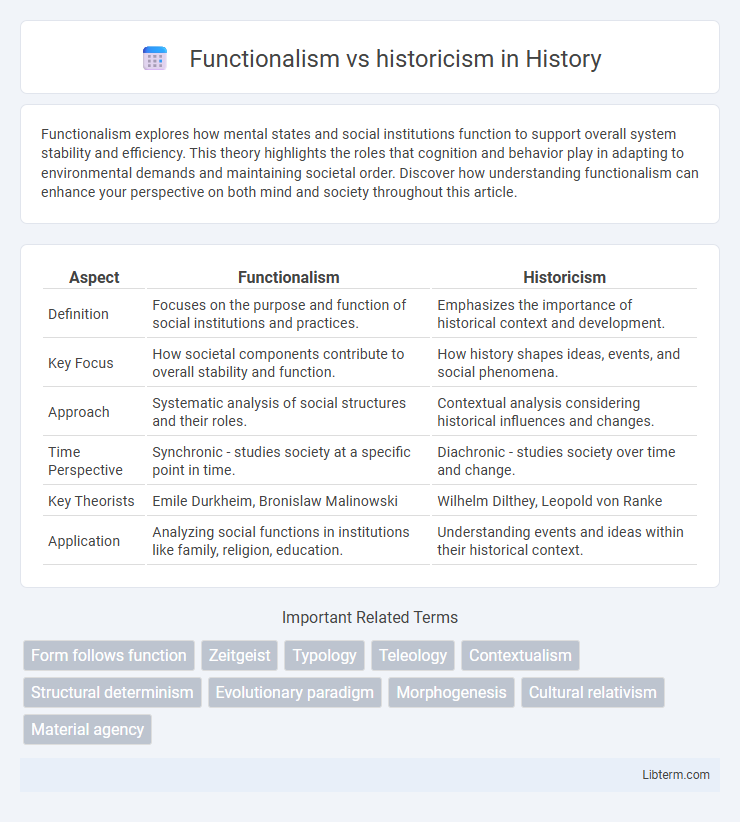Functionalism explores how mental states and social institutions function to support overall system stability and efficiency. This theory highlights the roles that cognition and behavior play in adapting to environmental demands and maintaining societal order. Discover how understanding functionalism can enhance your perspective on both mind and society throughout this article.
Table of Comparison
| Aspect | Functionalism | Historicism |
|---|---|---|
| Definition | Focuses on the purpose and function of social institutions and practices. | Emphasizes the importance of historical context and development. |
| Key Focus | How societal components contribute to overall stability and function. | How history shapes ideas, events, and social phenomena. |
| Approach | Systematic analysis of social structures and their roles. | Contextual analysis considering historical influences and changes. |
| Time Perspective | Synchronic - studies society at a specific point in time. | Diachronic - studies society over time and change. |
| Key Theorists | Emile Durkheim, Bronislaw Malinowski | Wilhelm Dilthey, Leopold von Ranke |
| Application | Analyzing social functions in institutions like family, religion, education. | Understanding events and ideas within their historical context. |
Introduction to Functionalism and Historicism
Functionalism analyzes societal institutions based on the roles they perform in maintaining social stability and cohesion, emphasizing the interdependence of social structures. Historicism examines social phenomena through historical context, focusing on the development and evolution of cultural and social practices over time. While Functionalism highlights the functions and purposes of social elements, Historicism prioritizes chronological and contextual understanding of social change.
Defining Functionalism in Context
Functionalism in context examines social institutions and cultural practices based on the roles they serve in maintaining societal stability and coherence. It emphasizes understanding phenomena by their contributions to the overall system, analyzing how structures function to fulfill essential needs within a historical and cultural framework. This approach contrasts with historicism by prioritizing systemic utility over chronological or contextual origin.
Core Principles of Historicism
Historicism emphasizes understanding cultural and historical context as essential to interpreting social phenomena, viewing events and ideas as products of their time influenced by unique temporal and spatial circumstances. It rejects universal laws, advocating for a detailed, contextual analysis that considers the evolving interplay of social, political, and economic factors. This principle contrasts sharply with functionalism, which seeks generalizable patterns and functions within social systems across different contexts.
Historical Development of Both Theories
Functionalism emerged in the early 20th century, primarily through the work of sociologists like Emile Durkheim, emphasizing social institutions' roles in maintaining societal stability and coherence. Historicism developed earlier in the 19th century, influenced by Wilhelm Dilthey and Leopold von Ranke, focusing on understanding social phenomena through historical context and cultural specificity. The historical development of functionalism highlights a shift towards analyzing social functions and systemic interrelations, while historicism advanced the idea of interpreting human activities as products of their unique historical environments.
Contrasts in Methodological Approaches
Functionalism emphasizes analyzing social institutions and cultural practices based on their roles and contributions to societal stability and cohesion. Historicism prioritizes understanding phenomena through their historical context, development, and evolution over time, highlighting temporal change and contingencies. Functionalism employs a synchronic method focusing on present functions, while historicism uses a diachronic approach emphasizing historical processes and transformations.
Functionalism: Focus on Structure and Purpose
Functionalism emphasizes understanding social institutions by analyzing their structure and purpose within a society. This approach views each social element as contributing to the overall stability and functioning of the system, highlighting roles such as education providing socialization or laws maintaining order. By focusing on these interconnected functions, Functionalism reveals how societal components work together to sustain cohesion and continuity.
Historicism: Emphasis on Historical Context
Historicism prioritizes the understanding of cultural and social phenomena within their specific historical contexts, asserting that meaning and value are shaped by temporal and situational factors. This approach emphasizes the importance of examining events, artifacts, and ideas as products of their unique historical periods, resisting universal or ahistorical interpretations. By analyzing historical context, historicism reveals the dynamic interplay between past conditions and contemporary developments, offering deeper insights into cultural evolution.
Practical Applications in Social Sciences
Functionalism emphasizes analyzing social institutions based on the roles they play in maintaining societal stability, which informs practical applications such as policy development and organizational structuring. Historicism prioritizes understanding social phenomena through their historical context and evolution, guiding researchers and practitioners in interpreting cultural dynamics and social change over time. Both frameworks contribute to social sciences by offering distinct approaches: functionalism supports system-oriented interventions, while historicism enhances contextual analysis for informed decision-making.
Critiques and Limitations of Each Perspective
Functionalism faces criticism for its tendency to overlook historical context and social change by emphasizing the stability and functionality of societal institutions without accounting for conflict or power dynamics. Historicism is limited by its focus on historical uniqueness and context, often neglecting broader social functions and generalizable patterns across societies. Both perspectives struggle with balancing the analysis of social structures and temporal specificity, limiting their comprehensive explanatory power in understanding social phenomena.
Conclusion: Bridging or Diverging Paths
Functionalism emphasizes understanding the social or cultural phenomena by their roles and purposes within a system, while historicism prioritizes the contextual and chronological development of ideas and practices. The conclusion reveals that these approaches can either bridge complementary insights--linking function with historical context--or diverge fundamentally due to differing epistemological foundations. Integrating functionalism's systemic analysis with historicism's emphasis on temporal evolution offers a more comprehensive framework for social and cultural research.
Functionalism Infographic

 libterm.com
libterm.com